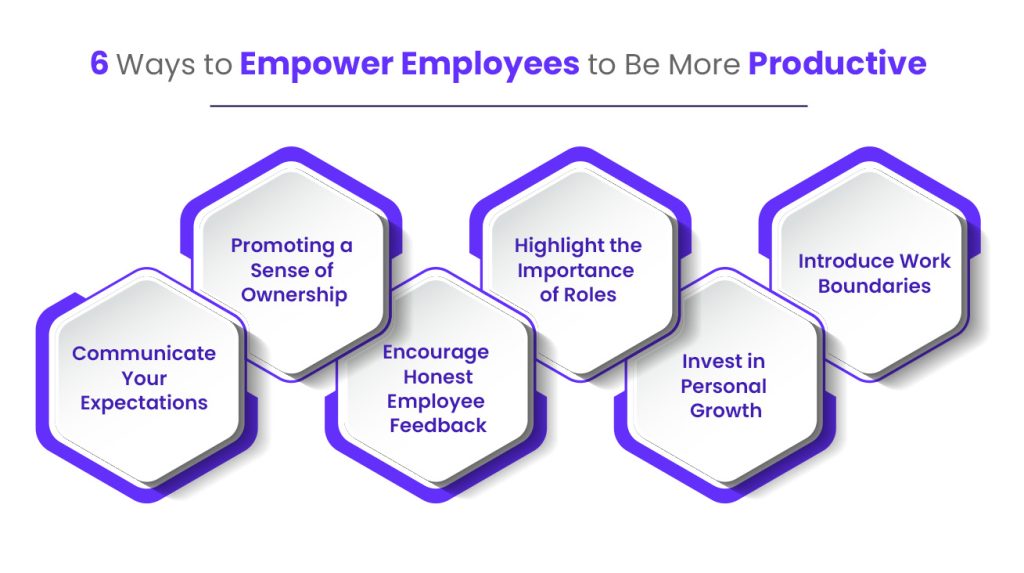
Empowerment of employees is increasingly becoming a crucial aspect of every workplace culture. They should be able to make decisions for the betterment of our organisation on their own. That’s where true empowerment lies!
In this blog, we discuss six ways on how to empower employees to pursue sustainable growth that every manager can implement in their workplace.
6 Ways to Empower Employees to Be More Productive
As managers, we are always seeking ways to improve the team’s performance and boost the company’s success. I suggest the following six strategies to empower the employees and increase their engagement at work:
Communicate Your Expectations
Employee empowerment begins with a sense of knowing what is truly expected of them.
First and foremost, you start by defining the common goal. These goals should be aligned with the job roles of every one part of that goal. Next, you set the roles, responsibilities, and expectations of each one. Just ensure that you assign responsibilities based on the strengths and weaknesses of people. Also, these expectations should be realistic.

Managers who communicate responsibilities and expectations at the start of a project, find employees better committed to the project outcome.
When things go wrong, remember to be the guidance they need. With the right help and motivation, employees are better engaged to achieve set goals with ease.
Promoting a Sense of Ownership
In a recent study by Forbes, 71% of employees find micromanagement interfering with their job performance. This may make employees disengaged from their work!
Managers should give freedom and trust to the decision-making abilities of their employees. They may not do everything of your own accord, still let them approach tasks their way! Only when employees take ownership of their work and are accountable for their actions, are they better engaged in their role.
While employees are coming up with fresh ideas and innovative techniques, managers can provide support and guidance. Help them embrace their mistakes and learn from them! Remember a manager’s trust in their employees sets a bar high for excellence.
Encourage Honest Employee Feedback
Too many workplaces still operate with a closed-door policy where feedback only travels down from management. This won’t encourage employees to participate in decision-making and voice their opinions.
In an empowered work culture, communication is a two-way street. Employees have a real voice to convey their concerns and feedback without the fear of rebuke.
A workplace should be a safe space for healthy debates during differences of opinions and ideas, project performance reviews, and constructive feedback. We should encourage an environment of honest employee feedback to create a culture of empowerment. When they see their feedback taken seriously, they feel empowered!
Highlight the Importance of Roles
As a manager, create a culture where employees feel they are actually involved in the growth prospects of the company and not just one of the many people who work there. Frequent motivation and encouragement help even mediocre employees to perform to their full potential.
With a sense of knowing that their work brings crucial results and adds true value to the company’s growth, people are invested in their job responsibilities. Mindset plays a role and can cause positive differences in their love towards work.
Invest in Personal Growth
One of the most powerful ways to show your care to employees is by actively investing in their professional growth and development. Best talents always look out for opportunities to expand their knowledge base and skill sets.
Be proactive in providing them access to special projects to expand their horizons. When you see their long-term potential and are committed to helping them step up the career ladder, your company’s growth and development go hand-in-hand.
Introduce Work Boundaries
Employee empowerment is often confused as turning people into workaholics. That’s never the idea!
In today’s always-on work culture, respecting time boundaries is requisite! Employees have a life outside the workplace; work is just one part of their holistic identity.
With employee empowerment, we are making them healthily attached to their work. It’s about making them passionate about their job! This will then increase their engagement and obsession towards the work. But that doesn’t mean their work-life balance should be compromised!
Managers should encourage those who work smarter, not harder. Convey it is not the number of hours they spend in a workplace that really matters but productivity and results do!
Conclusion
It is every manager’s responsibility to cultivate a work culture where employees feel valued, empowered, and supported.
Promoting a sense of ownership, investing in an employee’s personal growth, and introducing time boundaries for the efforts that your employees put into their work comes with numerous benefits. In fact, 72% of employees say empowerment impacts their decision to stay long-term.
So, employee empowerment does pay off with the company’s success and employee retention!
Follow me on LinkedIn
Frequently Asked Questions
1. Why to empower employees in the workplace?
Employee empowerment is about giving people a true voice to participate in decision-making that truly drives an impact. It is one of the most effective ways to make people invested in their work.
2. How to empower employees to take ownership?
Managers can empower their teams to take ownership by trusting their decision-making abilities and giving them the freedom to decide the flow of the project.
3. What’s the difference between empowerment and micromanagement?
Micromanagement is about control, whereas empowerment is about enabling employees to voice their opinions and share their ideas. While micromanagers often struggle with delegation and distribution of ownership, empowered managers excel at it.
4. What are the benefits of investing in personal growth for employees?
Investing in personal growth shows employees that their managers care about their professional development. This increases employee loyalty, motivation, and overall job satisfaction. It also helps retain top talent and improves overall team performance.
5. How can managers balance employee empowerment with work-life balance?
Managers must promote a healthy work-life balance to encourage those who work smarter, not harder. Empowering employees means encouraging employee’s passion and dedication towards work while respecting their mental well-being.



